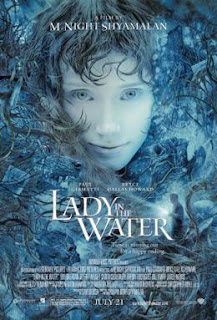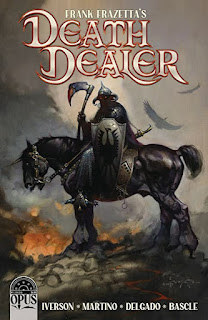Back when I was in high school, one of the first movies I rented when I got my own Blockbuster card (remember those?) was An American Werewolf in London. For Myopia Movies' October werewolf month, a movie pretty much everybody wanted to do was this one, so away we went. Here is the podcast episode. And now for the review...
The Plot
David Kessler (David Noughton) and Jack Goodman (Griffin Dunne) are backpacking through Europe and detour (for some reason) into rural northern England on their way to meet up with friends in Italy. After an awkward encounter with some villagers, they're warned to stay on the roads and stay off the moors--and they don't. Something big and vicious attacks them, killing Jack and chewing up David before the villagers arrive to kill it.
David awakens weeks later in a London hospital under the care of nurse Alex Price (Jenny Agutter) with a bunch of new scars--and the unwelcome presence of the ghostly, decaying Jack, who warns him that he's now a werewolf. To allow Jack to move on into the afterlife and not take any more lives, David needs to commit suicide pronto.
What happens next? Well, watch the movie to find out...
The Good
*The performances and characterizations are very good. Noughton does a good job playing David as he goes through all the mental and physical changes his condition imposes on him. Dunne does well as Jack, and keeps it up well even though he begins to increasingly resemble Achmed the Dead Terrorist. And Agutter's Alex is good as well--although she doesn't exactly display a lot of common sense (more on that later), she is well-developed as a compassionate nurse who cares about David and the children in her ward.
*Although the comedy is quite dark, it's pretty funny. The hijinks of the undead Jack are a big part of it, but there's plenty more.
*The transformation sequences are very well-done, especially since we're using 1981 technology. All practical effects, including effects that are actually attached to the human body.
*The movie gets a lot of British cultural details right, like how British police typically don't carry guns and have to call in special units with rifles when things get out of hand.
*David is Jewish and it's implied Jack is too. That's not something one typically sees in horror films--most characters don't seem religious at all, and those that are are at least nominally Christian.
The Bad
*There are a couple scenes, like one where David is pacing around Alex's apartment, reading her books, and generally moping, that don't seem to serve much of a purpose. That scene, for example, would have made more sense if Jack had put in another appearance warning him about what's coming that very night. The opening at least has the point of establishing the desolation of rural northern England--setting the scene--even if it goes on for too long.
*One scene kind of defies common sense--the famous transformation scene takes place in Alex's apartment. Do the neighbors not hear the screaming? There's a missed opportunity for comedy--since Alex is a nurse, a neighbor could comment that she must be bringing her work home with her. Or, since Alex is fairly open about her promiscuity, perhaps the neighbor is smirking and says something like, "I wonder who it is this time?" There's a joke about people mistaking a werewolf killing someone for "hooligans in the park," so this type of humor would fit nicely.
*London is a pretty distinctive city and probably a better draw for viewers, but if David and Jack are attacked somewhere in the northern part of England, it would make more sense to set the movie in a big city like Manchester. More creative too, since London is in movies a lot but the North of England, not so much.
*David is unconscious for three weeks? He was conscious when the villagers rescued him and his injuries were largely superficial. Not only does that not make a lot of sense, but as we briefly discussed on the podcast, being immobile for that long should lead to him losing a lot of strength. He should have trouble walking. I would keep the coma a bit shorter and then depict him doing physical therapy with Alex for the rest of the time it takes to get to the next full moon. To avoid taking up too much time, this could be a montage, possibly even set to an appropriate song. That would explain how they bond so quickly and a patient and the person assisting them becoming involved romantically is something that does happen. Alex having worked with David regularly for weeks is a much better basis for a relationship that "I've been taking care of you while you were unconscious for three weeks and a couple days after you woke up."
Also, even if Alex is promiscuous, inviting someone you've known for maybe two days to crash with you is dangerous, especially given that Alex is aware David was involved in some kind of violent mishap (why he's hospitalized in the first place). Even if Alex does not object to premarital sex on moral grounds, one would hope a nurse (i.e. an educated professional) has the intelligence and common sense to not invite essentially a potentially-violent stranger to live with her.
A prolonged courtship between Alex and David could also be played for laughs--Jack's increasingly decayed ghost is hanging around David's physical therapy routines, commenting on his relationship with Alex and urging David to kill himself while David keeps coming up with elaborate excuses as to why he's talking to somebody nobody else can see. Alex and/or the doctors could just write it off as symptoms of PTSD or head trauma, much to Jack's increasing frustration.
*David being Jewish could be built up a bit more--although this is supposed to be a horror-comedy, perhaps that's one reason he won't commit suicide. "There aren't enough of us left in the world." David at one point has a nightmare about Nazis and assuming he was born in the late 1950s or early 1960s, the Holocaust is something that would weigh heavily on him. Given how Alex clearly isn't Jewish, Zombie Jack can also make some shiksa jokes.
The Verdict
Definitely worth watching again. 9.0/10


.jpg)
_poster.jpg)





